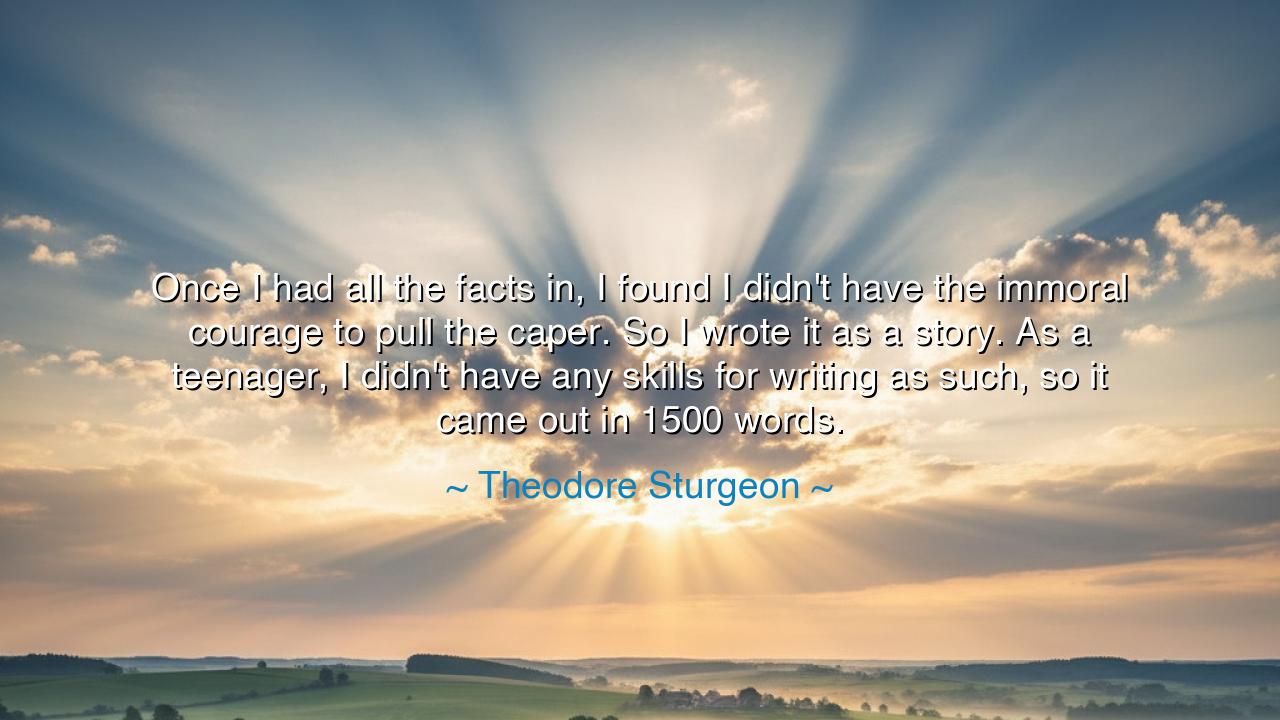
Once I had all the facts in, I found I didn't have the immoral
Once I had all the facts in, I found I didn't have the immoral courage to pull the caper. So I wrote it as a story. As a teenager, I didn't have any skills for writing as such, so it came out in 1500 words.






“Once I had all the facts in, I found I didn’t have the immoral courage to pull the caper. So I wrote it as a story. As a teenager, I didn’t have any skills for writing as such, so it came out in 1500 words.”
Thus spoke Theodore Sturgeon, one of the great dreamers of science fiction, whose tales shimmered with both imagination and moral depth. In this quote, he reveals the seed of his creative calling — the moment when his heart, standing at a crossroad between wrongdoing and creation, chose the nobler path. He speaks of “immoral courage”, the strength it takes to do something wrong knowingly, and how, lacking that, he turned his impulse into art. What he could not commit as an act of harm, he redeemed as an act of storytelling. In that single decision lies a profound truth: when one cannot act destructively, one can still act creatively.
The origin of these words reaches back to Sturgeon’s youth, before he became a writer of renown. Like many young souls, he was tempted by mischief — drawn to the thrill of transgression. He had planned what he called a “caper,” perhaps a small crime or daring escapade. Yet when he gathered all the details and faced the choice, he realized he lacked the courage to do wrong. But this absence was not weakness; it was the presence of conscience. Instead of suppressing the energy that had driven him, he redirected it — he wrote. Out of temptation was born transformation. The story he penned, though rough and unpolished, was the first flame of a lifelong vocation. Thus, his failure to sin became his success in creation.
In his reflection, Sturgeon draws a subtle distinction between two forms of courage: the immoral courage to do what one knows is wrong, and the moral courage to choose another path entirely. The world often celebrates boldness in all its forms, but true greatness lies not in daring without conscience, but in daring to obey one’s conscience. The immoral act requires defiance; the moral act requires restraint — and restraint, too, is a form of strength. When Sturgeon could not bring himself to act against what he knew was right, he found another outlet for the same passion — the imagination. He transformed impulse into art, desire into discipline. Such is the way of all creation: from chaos is born harmony, when the heart learns to choose wisely.
This transformation finds its echo in the story of Fyodor Dostoevsky, who once stood before a firing squad in Tsarist Russia, condemned for revolutionary thought. In the final moments before what he believed would be his death, he saw life with new eyes — vivid, fragile, holy. The execution was stayed, and from that moment on, Dostoevsky’s works were filled with compassion, suffering, and redemption. Like Sturgeon, he discovered that the human soul is shaped not only by what it dares to do, but by what it dares not to do. Moral courage, the strength to resist destruction and choose creation, is the foundation of true artistry and wisdom.
Sturgeon’s words also remind us that creation is born from conflict. The tension between what we desire and what we know is right often gives rise to our deepest insights. Many of humanity’s greatest works — songs, paintings, stories — are the children of restraint. When we deny the destructive impulse, its energy does not vanish; it transforms. It becomes the fire of invention. The same hand that might have harmed can instead build. The same mind that might have schemed can instead dream. Sturgeon’s youthful temptation became his teacher, guiding him toward the realization that writing is a moral act — an act of turning darkness into light, temptation into truth.
For those who seek wisdom in his story, the lesson is clear: when faced with the pull of wrongdoing, do not suppress the fire — redirect it. When anger rises, let it forge justice; when envy stirs, let it inspire effort; when temptation calls, let it awaken creativity. Within every dark impulse lies a spark that, if transmuted, can give life instead of destruction. The task of the wise is not to extinguish fire, but to give it purpose. As Sturgeon did, you too can transform your inner restlessness into expression, your rebellion into art, your chaos into order.
So, my child, remember this teaching: courage alone is not enough — it must be tempered by conscience, guided by purpose, and redeemed by creation. When you find yourself standing at the edge of wrongdoing, as Sturgeon once did, ask yourself what noble act might be born from that same desire. For even the heart that flirts with darkness can become the heart that writes of light. And if, like Sturgeon, your first creation comes clumsy and small — no matter. It is enough that it exists, that you chose the path of making over breaking. In time, that choice will define your destiny.
For true courage is not the power to do wrong — it is the strength to turn wrong into beauty, and impulse into art.






AAdministratorAdministrator
Welcome, honored guests. Please leave a comment, we will respond soon